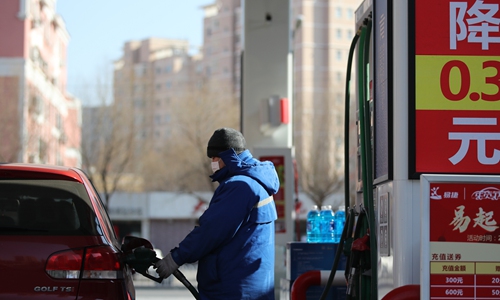Oil producers, refiners call for cancellation of refined oil floor rates
By Wang Sheng Source:Global Times Published: 2020/5/28 18:17:44

A worker fills his tank at a gas station in Shenyang, capital of Northeast China's Liaoning Province, on Wednesday. China reduced retail prices of gasoline and diesel from Wednesday based on recent changes in international oil prices. The retail price of gasoline was reduced by 420 yuan ($60) per ton and diesel by 405 yuan, according to the National Development and Reform Commission. Photo: cnsphotos
The Chinese oil industry has sparked a hot debate on whether or not floor rates for retail fuel should be canceled. While international crude oil prices have taken a dive in recent months, domestic refined oil products, including gasoline and diesel have touched China's floor rates.
According to China's current pricing mechanism, refined oil product prices are adjusted every 10 working days when international crude oil prices see changes of no less than 50 yuan per ton. China will not adjust retail prices for refined oil products when international crude oil prices fall below $40 per barrel, the floor rate, or above $130 per barrel, the ceiling. The mechanism sets maximum retail prices for gasoline and diesel, which vary across the country.
Chinese prices for gasoline and diesel will not be adjusted for the next 10 working days despite the fact that international oil prices have dropped below $40 per barrel, the National Development and Reform Commission (NDRC) said on Thursday.
This is the fifth consecutive time since March 31 that refined oil prices in the domestic market won't be adjusted because they have touched the floor rates, the Global Times learned.
China's energy resources, rich in coal with little oil and gas, require the country to import large volumes of crude oil annually. Therefore, gasoline and diesel prices are indexed with international oil prices, the Global Times learned.
Huang He, president of the Hunan subsidiary of China Petrochemical Corp and a deputy to the 13th National People's Congress, China's top legislature, suggested that China should cancel its floor rate mechanism to maintain a fair market and help its economy recover post-COVID-19.
"The floor rate mechanism is bad for consumers benefiting from weak international crude oil prices. It influences economic recovery and production resumption," Huang said, according to domestic news site ce.cn.
Under the pricing mechanism, when the global crude oil price falls below $40 per barrel, the incremental profit margin for the Chinese refining industry will be directed to a special risk reserve, which will allocate funds to oil product upgrades, the security of the oil supply, energy conservation and emission reduction.
However, price limitations go against a fair market. The incremental profit margin is mainly collected from state-owned refineries. Many domestic private refineries did not pay money to the special risk reserve, Li Li, research director at energy consultancy ICIS China, told the Global Times.
Additionally, some refineries misunderstand the pricing mechanism. Refineries usually sell their refined oil products at prices set by the NDRC, said Li. Misunderstandings mean some refineries treat the maximum prices as the "wholesale price."
Misunderstanding has even pushed up prices of oil blends in the domestic market. Therefore, many refineries import blended oils from external markets like Singapore and Malaysia, which is unfair to the domestic market, Li added.
Huang suggested China should carry out trails to set prices according to the domestic refining market. In early trials, the Shanghai Petroleum and Natural Gas Exchange (SHPGX) could use an open outcry system to trade spot fuels, providing benchmark prices for the market.
Experts also suggested the government should transform from a price setter to a regulator, ceasing to intervene in normal price fluctuations for refined oil products.
Conversely, some insiders think the pricing mechanism aims to buffer the negative effects of violent fluctuations and maintain China's energy security, as China is the largest crude oil importer and the second-largest crude consumption country in the world.
In extreme cases, Huang said that when global oil prices are very high, the government can release a part of its oil reserves to calm the world market. In an exceptionally low oil price scenario, the government can subsidize the oil exploration sector, maintaining normal operations on oilfields.
Global Times
Posted in: INDUSTRIES,MARKETS